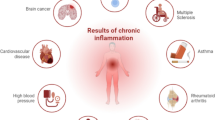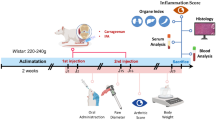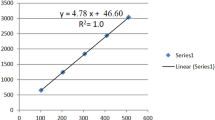Abstract
Xanthii Fructus (XF) is an herb widely used in medicine for the treatment of a variety of inflammatory pathologies. In this study, using mouse peritoneal macrophages, we have examined whether XF affects nitric oxide (NO), tumor necrosis factor (TNF)-α, and interleukin (IL)-12p40 production induced by interferon (IFN)-γ and lipopolysaccharide (LPS). XF inhibits IFN-γ and LPS-induced NO production in a dose dependent manner. The decrease in NO synthesis was reflected as a decreased amount of inducible NO synthase protein. Furthermore, we also found that XF inhibits pro-inflammatory cytokine TNF-α production. However, treatment of XF in peritoneal macrophages had no effect on IL-12p40 production. These findings suggest that XF may be used in controlling macrophages-mediated inflammatory diseases.
Similar content being viewed by others
References
Chu, T. R., and Y. C. Wei. 1965. Studies on the principal unsaturated fatty acids of the seed oil of Xanthium strumarium. Yao Hsueh Hsueh Pao 12:709–712.
Kuo, Y. C., C. M. Sun, W. J. Tsai, J. C. Ou, W. P. Chen, and C. Y. Lin. 1998. Chinese herbs as modulators of human mesangial cell proliferation: Preliminary studies. J. Lab. Clin. Med. 132:76–85.
Hong, S. H., H. J. Jeong, and H. M. Kim. 2003. Inhibitory effects of Xanthii fructus extract on mast cell-mediated allergic reaction in murine model. J. Ethnopharmacol. 88:229–234.
Adams, D. O., and T. A. Hamilton. 1984. The cell biology of macrophage activation. Annu. Rev. Immunol. 2:283–318.
Schimmer, B. P., and K. L. Parker. 2001. Adrenocorticotropic hormone; adrenocortical steroids and their synthetic analogs; inhibitors of the synthesis and actions of adrenocortical hormones. In: The Pharmacological Basis of Therapeutics 10th edn., J. G. Hardman, L.E. Limbird, and A. Goodman Gilman, eds., McGraw-Hill, New York, pp. 1649–1677.
Nathan, C. F. 1992. Nitric oxide as a secretory product of mammalian cells. FASEB J. 6:3051.
Xie, Q. W., H. J. J. Cho, R. A. Mumford, K. M. Swiderek, T. D. Lee, A. Ding, T. Troso, and C. Nathan. 1992. Cloning and characterization of inducible nitric oxide synthase from mouse macrophages. Science 256:225.
Petros, A., D. Bennet, and P. Vallance. 1991. Effects of nitric oxide synthase inhibitor on hypotension in patients with septic shock. Lancet 338:1557–1558.
Thiemermann, C., and J. Vane. 1990. Inhibition of nitric oxide synthesis reduces the hypotension induced by bacterial lipopolysaccharides in the rat in vivo. Eur. J. Pharmacol. 182:591–595.
Evans, C. H. 1995. Nitric oxide: What role does it play in inflammation and tissue destruction? Agents Actions Supplement 47:107–116.
O’Shea, J. J., A. Ma, and P. Lipsky. 2002. Cytokines and autoimmunity. Nat. Rev. Immunol. 2:37–45.
Gorman, J. D., K. E. Sack, and J. C. Davis, Jr. 2002. Treatment of ankylosing spondylitis by inhibition of tumor necrosis factor alpha. New Engl. J. Med. 346:1349–1356.
Chung, H. S., H. J. Jeong, S. H. Hong, M. S. Kim, S. J. Kim, B. K. Song, I. S. Jeong, E. J. Lee, J. W. Ahn, S. H. Baek, and H. M. Kim. 2002. Induction of nitric oxide synthase by Oldenlandia diffusa in mouse peritoneal macrophages. Biol. Pharm. Bull. 25:1142–1146.
Jeong, H. J., H. S. Chung, H. J. An, J. B. Kim, E. M. Lee, E. J. Park, C. H. Jang, S. H. Hong, and H. M. Kim. 2003. Immune-enhancement effect of the herbal combination Allergina. Clin. Chim. Acta. 337:77–84.
Williams, D. H., and I. Fleming. 1995. Spectroscopic Methods in Organic Chemistry, Mcgraw-Hill Book Co., New York-London, pp. 63–169.
Hsu, H. Y., Y. P. Cheu, and M. Hong. 1982. The Chemical Constituents of Oriental Herbs. Oriental Healing Arts Institute, Los Angeles, California, pp. 1000–1005.
Koyanagi, M., K. Egashira, M. Kubo-Inoue, M. Usui, S. Kitamoto, H. Tomita, H. Shimokawa, and A. Takeshita. 2000. Role of transforming growth factor-beta1 in cardiovascular inflammatory changes induced by chronic inhibition of nitric oxide synthesis. Hypertension 35:86–90.
Blackman, D. J., J. A. Morris-Thurgood, J. J. Atherton, G. R. Ellis, R. A. Anderson, J. R. Cockcroft, and M. P. Frenneaux. 2000. Endothelium-derived nitric oxide contributes to the regulation of venous tone in humans. Circulation 18:165–170.
Sharma, R., A. J. Coats, and S. D. Anker. 2000. The role of inflammatory mediators in chronic heart failure: Cytokines, nitric oxide, and endothelin-1. Int. J. Cardiol. 15:175–186.
Fischer, L. G., D. J. Horstman, K. Hahnenkamp, N. E. Kechner, and G. F. Rich. 1999. Selective iNOS inhibition attenuates acetylcholine- and bradykinin-induced vasoconstriction in lipopolysaccharide-exposed rat lungs. Anesthesiology 91:1724–1732.
Kettelhut, I. C., W. Fiers, and A. L. Goldberg. 1987. The toxic effects of tumor necrosis factor in vivo and their prevention by cyclooxygenase inhibitors. P. Nat. Acad. Sci. USA. 84:4273–4277.
Connelly, L., M. Palacios-Callender, C. Ameixa, S. Moncada, and A. J. Hobbs. 2001. Biphasic regulation of NF-kappa B activity underlies the pro- and anti-inflammatory actions of nitric oxide. J. Immunol. 15:3873–3881.
Chung, H. S., H. J. An, H. J. Jeong, J. H. Won, S. H. Hong, and H. M. Kim. 2004. Water extract isolated from Chelidonium majus enhances nitric oxide and tumour necrosis factor-alpha production via nuclear factor-kappaB activation in mouse peritoneal macrophages. J. Pharm. Pharmacol. 56:129–134.
Remick, D. G., R. M. Strieter, M. K. Eskandari, D. T. Nguyen, M. A. Genord, C. L. Raiford, and S. L. Kunkel. 1990. Role of tumor necrosis factor-alpha in lipopolysaccharide-induced pathologic alterations. Am. J. Pathol. 136:49–60.
Zhang, X., and D. C. Morrison. 1993. Pertussis toxin-sensitive factor differentially regulates lipopolysaccharide-induced tumor necrosis factor-alpha and nitric oxide production in mouse peritoneal macrophages. J. Immunol. 1:1011–1018.
Kaisho, T., O. Takeuchi, T. Kawai, K. Hoshino, and S. Akira. 2001. Endotoxin-induced maturation of MyD88-deficient dendritic cells. J. Immunol. 1:5688–5694.
Chae, Y. B., W. J. Kim, O. P. Zee, M. J. Ahn, and Y. J. No. 1998. Information of Korea Useful Herbal Medicine, Korea Research Institute of Chemical Technology, Taejeon, pp. 267–278.
Park, S. Y., E. Y. Moon, O. P. Zee, and E. K. Park. 1990. Immunostimulating activity of water extract from herbal drugs (I): Immunosuppressing activity of water extract from Xantium strumarium. Korea J. Immunology. 12:119.
Hsu, F. L., Y. C. Chem, and J. T. Cheng. 2000. Caffeic acid as active principle from the fruit of Xanthium strumarium to lower plasma glucose in diabetic rats. Planta Med. 66: 228–230.
Author information
Authors and Affiliations
Corresponding author
Rights and permissions
About this article
Cite this article
An, HJ., Jeong, HJ., Lee, EH. et al. Xanthii Fructus Inhibits Inflammatory Responses in LPS-Stimulated Mouse Peritoneal Macrophages. Inflammation 28, 263–270 (2004). https://doi.org/10.1007/s10753-004-6049-9
Issue Date:
DOI: https://doi.org/10.1007/s10753-004-6049-9




